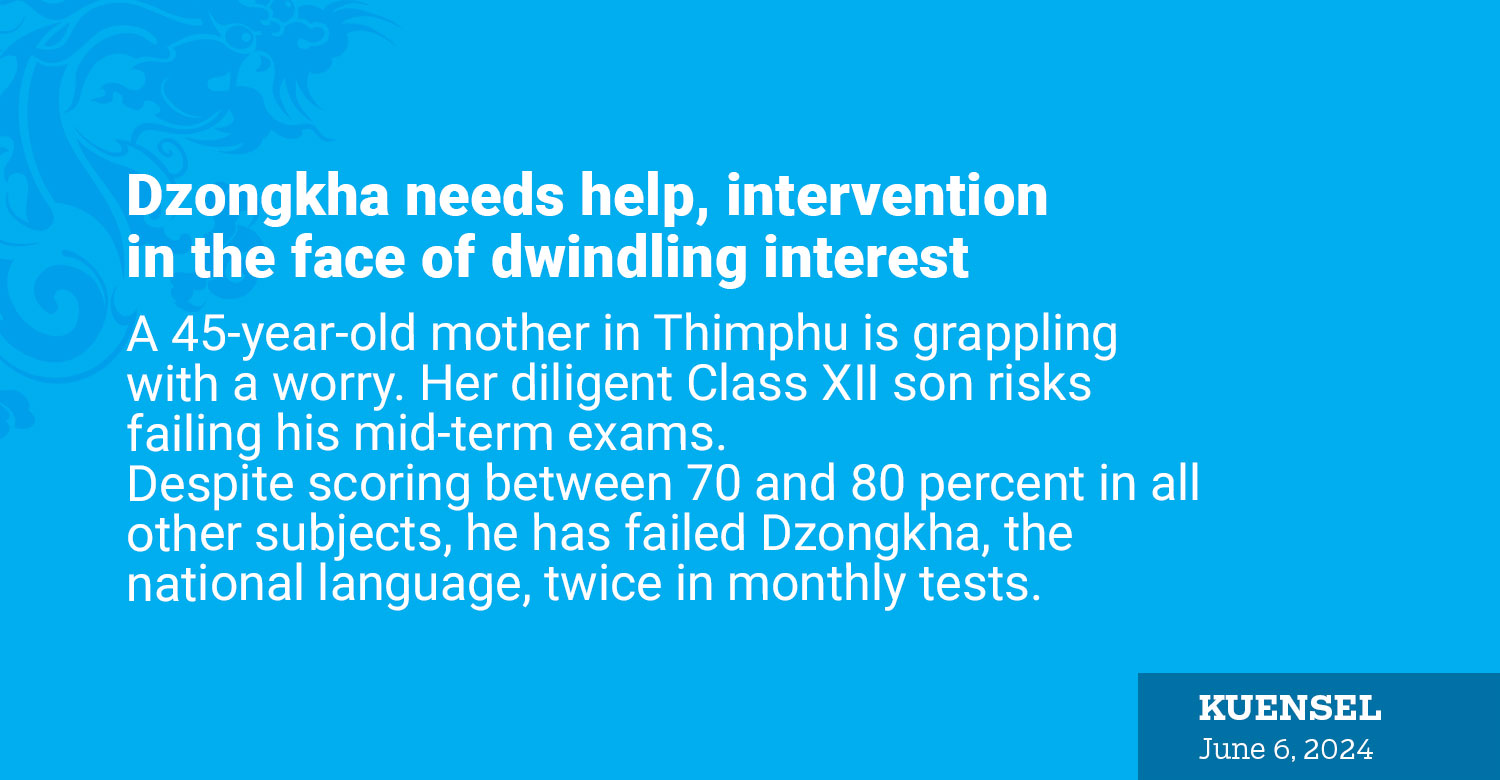
A 45-year-old mother in Thimphu is grappling with a worry. Her diligent Class XII son risks failing his mid-term exams.
Despite scoring between 70 and 80 percent in all other subjects, he has failed Dzongkha, the national language, twice in monthly tests.
Another mother in Thimphu is grappling with another worry. Her two young children cannot communicate with their grandparents in their mother tongue, a language of the east. English has become the de facto first language at her home. The two children cannot speak a word of their parents’ language and struggle with basic Dzongkha.
The two mothers’ worry highlights a broader, systemic issue: the declining quality of Dzongkha education and resources.
An employee in a print media house recently reached out to a school principal in Trashigang Dzongkhag to subscribe to a Dzongkha e-newspaper for students, only to be told that budget constraints made it impossible. This struggle for resources is part of a broader crisis facing Dzongkha journalism.
Bhutan’s last two vernacular newspapers, Kuensel and Gyalchi Sershog, are on the verge of closure, contrasting sharply with the thriving mother language journalism in neighbouring Nepal, India, and Bangladesh.
Dzongkha, Bhutan’s national language, is crucial to the country’s identity and sovereignty. In 2023, the two media houses appealed to the government for support, suggesting subscriptions to Dzongkha newspapers for students and institutions under the Royal University of Bhutan.
A committee of Dzongkha experts recommended government intervention to prevent the language from fading. However, the recommendations have been stalled due to a lack of funds, according to Gyalchi Sershog’s owner, Gembo Dorji.
Call for government intervention
In light of the challenges facing vernacular language journalism, a group of media professionals and journalists from SAARC countries convened in Kathmandu, Nepal, the first International Mother Language Journalist Conference. Journalists from the region called on governments and stakeholders to develop, preserve, and promote mother language journalism globally.
The conference resulted in the eight-point Kathmandu (Thimi) Declaration, which demands the preservation of mother languages. The declaration, signed by executive members of the SAARC Journalists Forum (SJF), urges governments to implement these measures.
Additionally, they proposed declaring the birth anniversary of Nepal’s first mother language journalist, Dharmaditya Dharmacharya, as International Mother Language Journalism Day. Dharmacharya, a writer and activist, published the first magazine in Nepal Bhasa, Buddha Dharma, from Kolkata, India, in 1925.
Organised by the National Forum for Newar Journalists with support from the SJF and the Federation of Nepalese Indigenous Journalists, the two-day conference featured over 50 journalists from SAARC countries and 100 from Nepal. The organising committee’s president, Surendra Bhakta Shrestha, stated that the declaration would be submitted to government heads and stakeholders for implementation.
The state of Dzongkha
Efforts to promote Dzongkha as Bhutan’s national language date back to 1970 when His Majesty the Third King decreed the teaching of religious texts, arts, and history in schools alongside modern education. This was initially in Choekey, the classical Tibetan language.
The following year, His Majesty Jigme Dorji Wangchuck commanded that school textbooks be written in simple spoken Dzongkha. The national identity was further solidified when Bhutan joined the United Nations and declared Dzongkha as the national language in September 1971.
Since then, Dzongkha has been vital in preserving Bhutan’s sovereignty and cultural identity. The National Assembly passed laws mandating that civil servants use Dzongkha for official communication, emphasising its importance in Parliament. “Promoting Dzongkha remains a priority, despite budget constraints,” a former national language teacher said.
Another mother in Thimphu expressed her frustration, noting that her two sons, studying in Classes X and XII, struggle to read Dzongkha textbooks, even the Dzongkha questions on their exam papers. “When they can’t understand or read the question papers properly, they fail their exams,” she said.
Many students face similar difficulties, risking the loss of the efforts of successive monarchs and National Assembly resolutions to preserve the language.
Kuensel’s CEO, Ugyen Penjor, in a written submission to the former prime minister in January 2023, emphasised that Bhutanese media could safeguard the country’s identity and develop Dzongkha vocabulary. Dzongkha Kuensel has played a crucial role in promoting and using Dzongkha since it was first published in 1965.
Despite suffering annual losses of over Nu 4 million, Kuensel continues to publish its Dzongkha edition due to its importance, according to Ugyen Penjor. However, financial difficulties have forced Kuensel to downsise its staff and reduce its publication frequency.
The liberalisation of print media licences in 2006 led to the establishment of five private Dzongkha newspapers – Bhutan Observer, Druk Yoezer, Druk Neytshuel, Druk Melong, and Gyalchi Sershog – in an attempt to compete with Dzongkha Kuensel. Unfortunately, these papers struggled with a lack of readership, advertisements, and financial viability, with most folding within five years.
As the quality of Dzongkha education and journalism continues to dwindle, it becomes increasingly crucial for the government and stakeholders to take decisive actions to preserve and promote the national language. “Without proper intervention, the rich cultural heritage and national identity tied to Dzongkha may be at risk of fading away,” Gembo Dorji said.












